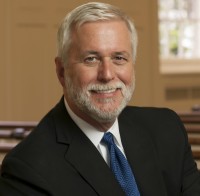Listening all the way into the pulpit
The preacher maintains a sacred conversation between God and the congregation.

There is an incredible moment, known only to a parish pastor, that occurs in every worship service. In many congregations this moment comes while the choir is singing the anthem, just before the sermon. As the choir sings the pastor sits in the preacher’s chair, looking at those in the pews and remembering their unfinished stories.
In the third pew on the right sits a newlywed couple, back in church for the first time since their wedding. They can’t keep their hands off each other. At the other end of that same pew is a new widow who’s back in the church for the first time since her husband’s funeral.
Read our latest issue or browse back issues.
A few rows back on the same side of the sanctuary is a family that is coming apart at the seams. The husband is angry that his wife wants to take a promotion that means moving the family. She’s angry that he’s holding her back. They’re both angry that they can’t get their teenage son to talk to them. The teenager, sporting a shock of purple in his hair, slumps in the pew to make it clear that’s he angry about being dragged to church.
Behind them, a young father cradles the baby girl the pastor baptized a few weeks ago. He tells himself she’ll never grow up to have purple hair. Two pews behind them is an older couple whose daughter is a wildly successful attorney in New York. She never talks to them.
Across the aisle, two-thirds of the way back, sits a well-dressed gentleman who will leave the worship service to go to the Alzheimer’s unit of a nearby nursing home to visit his wife. A couple of pews in front of him is a middle-aged couple who want the pastor to fire the youth director. And sitting just ahead of them is a single mother with a son in the army who’s hoping something will be said about those who put their lives in harm’s way.
The choir finishes its anthem. The pastor walks to the pulpit, prays, and dares to say, “Hear the word of the Lord.”
Part of the pastor’s calling is to maintain a sacred conversation between God and the congregation. Hopefully, the pastor has spent all week listening to God’s side of the conversation while carefully exploring the Sunday scripture text. When the pastor leaves the study to make visits to the hospital, bring communion to the nursing homes, or ponder the subtext of the angry man who is trying to hijack the agenda at a committee meeting, the sacred words of the biblical text are still swirling around as a third voice in every conversation. Throughout the week—back and forth between the study, the parish, newspapers, literature, movies, and even the pregnant quip from the cashier at the grocery story—the carefully heard words just keep piling up before the sermon can be written.
The pastor’s heart is a crucible for mixing together the holy words with the incredibly diverse words of hope, grief, anger, regret, love, gratitude, anxiety—the list seems to have no limit. There is no common theme. And yet all the people in the pews are hoping God will have a word for them. So what does it mean for the pastor to say, “Hear the word of the Lord” in the face of all of this yearning?
After preaching in three congregations filled with very different people, I finally learned to stop trying to do the Holy Spirit’s job. There is no way to write a sermon about newly made marital vows and newly found grief, and the aspirations versus realities of parenting, and illness, and the congregation’s problems, and anxiety about war. Nor should a sermon ever try. That would allow the congregation’s many voices to set the agenda for the sacred conversation, and it would limit preaching to peddling holy advice.
Seminary didn’t prepare me to be a therapist, motivational speaker, or manager. It trained me to think theologically. So my sermons may spiral back and forth between God’s voice and ours, like all good conversations, but in the end the gospel always gets the last word.
While I would never preach about purple hair, I may find that the same text has as much to say to parents as it does to the new widow, or to those who want to know when I am going to start fulfilling their expectations. Maybe the text that day offers something about our created limitations and our common need to receive and give grace. It’s up to the Spirit to take it from there. But that means at least I have to believe I’m not just talking about the word; I’m proclaiming it, and it will be used however God determines.
Like most pastors I’ve been humbled to hear people thank me for saying something profound that I didn’t really say. I take that to be the work of the Holy Spirit, who knew better than I what they needed to hear. At the incredibly large Myungsung Presbyterian Church in Seoul, the preachers are expected to take their shoes off before approaching the pulpit. That’s because the congregation considers it hallowed ground. And from that ground the Spirit brings God’s word into thousands of diverse hearts.
I’m responsible for the writing of the sermon but not the hearing of it. I get that. But of this, I am certain: it would be a very different sermon if I didn’t spend the week listening to God and the congregation as they try to talk to each other.
A version of this article appears in the print edition under the title “The preacher as listener.”






